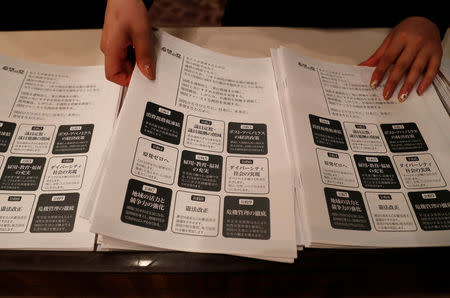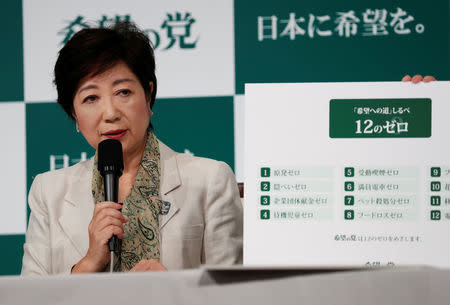Japan's new party vows to scrap over-reliance on fiscal, monetary steps
By Tetsushi Kajimoto and Leika Kihara TOKYO (Reuters) - Tokyo Governor Yuriko Koike’s new party on Friday unveiled an election platform that seeks to distance her "Yurinomics" policies from Prime Minister Shinzo Abe's aggressive stimulus, by cutting reliance on fiscal spending and monetary easing. Launched less than two week's ago, Koike's "Party of Hope" will take on Abe's ruling coalition in a national election called for Oct. 22. It has made populist calls to freeze a scheduled sales tax hike in 2019 and phase out nuclear power, in an effort to set itself apart from the government on key issues, but the fresh approach on the economy was given its own catchy name. "We'll carry out 'Yurinomics' that brings out private sector vitality, without relying excessively on monetary easing and fiscal spending," the Party of Hope said. "While maintaining the Bank of Japan's massive monetary easing for the time being, the government and the BOJ should work together to seek a smooth exit strategy," it added. "Yurinomics" is a piece of political branding to counter "Abenomics" - the name given to the aggressive monetary and fiscal stimulus measures and structural reforms Abe has adopted since returning to power in December 2012. Five years on, Abe's government can point to some signs that his strategy is finally fostering stronger economic growth and defeating deflation. Appointed by Abe, Bank of Japan Governor Haruhiko Kuroda still wants to give his money-printing ways more time to work, whereas the Hope party wants to debate a strategy to smoothly end them. Abe called the snap election last week in the hope his Liberal Democratic Party-led coalition will secure a simple majority in parliament's lower house, from its two-thirds "super majority" earlier. Amid signs that voters are disillusioned with Abe after nearly five years in power, Koike's Hope party, pitched as a "reformist, conservative" alternative to Abe's equally conservative LDP, has clouded the outlook, however. "By putting monetary policy on the table, Koike's platform could spur debate among a lot of lawmakers about the need to fix some of the things they think are wrong, and quantitative easing could be a candidate," said Shuji Tonouchi, senior market economist at Mitsubishi UFJ Morgan Stanley Securities. "Right now, the market impact is limited because the chances of her party forming a government are low." TAX FIRMS, PAY HOUSEHOLDS The new party says "Yurinomics" - derived from Koike's first name - will focus on deregulation and tax firms' massive internal reserves - worth around 300 trillion yen ($2.66 trillion) to encourage them to put unused cash to better use. It will also freeze the scheduled sales tax hike in 2019 and help low-income households with a "basic income" policy that regularly pays a set amount of money to all citizens. While the Party of Hope's conservative approach on defence and constitutional reform resembles that of Abe's LDP, its economic policy has a more populist streak, analysts say. "Basic income is being called for in some countries facing growing social inequality, so I'm not totally rejecting the idea," said Hiroshi Shiraishi, senior economist at BNP Paribas Securities. "But without a secure source of revenue, it's simply impossible." Abe's ruling coalition has pledged to proceed with the sales tax hike and use the revenues for child care and education. Koike said her party would build on Abenomics to bring the benefits of the economic recovery to more households. "We need to carry out a more meticulous economic policy and social reform that would strike people's heart," Koike told a news conference, where she reiterated that she would not stand in the coming election. Her party is open to debate on a possible revision of the constitution's pacifist chapter 9, whose literal interpretation would ban the maintenance of armed forces. In an interview, Abe told Kyodo news agency he wanted to win support from other parties, including Koike's, for the LDP's campaign pledge for a revision to provide a firm legal basis for Japan's military, the Self-Defence Forces. Koike, 65, a former defence minister and member of Abe's LDP, has not made clear whom her party would back as the next prime minister. She defied the LDP to run for governor last year, defeating the ruling party candidate by a landslide before leading her small local party to a huge victory on a reformist platform in a July Tokyo assembly election. ($1=112.8300 yen) (Additional reporting by Stanley White and Linda Sieg; Writing by Leika Kihara; Editing by Simon Cameron-Moore and Clarence Fernandez)



